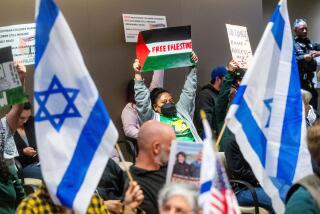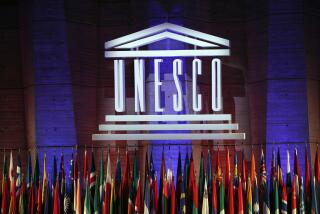PLO to Issue ‘Positive’ Response to Plan for Peace Talks : Middle East: A statement will clear the way for possible Palestinian participation but will not formally agree to attend.
- Share via
ALGIERS — The Palestine Liberation Organization cleared the way early today for possible Palestinian participation in a Middle East peace conference.
The PLO now will issue a “positive” response to the proposal for a conference sponsored jointly by the United States and the Soviet Union, possibly to be held in October. But the PLO will continue to seek a halt to Jewish settlements and the right to represent Palestinians in their search for a permanent homeland.
Nearing the end of a bitterly divisive, five-day session of the PLO’s “parliament-in-exile,” delegates voted 256-68 to support a carefully worded statement of the Palestine National Council, which stopped short of formally agreeing to attend a U.S.-brokered conference.
But the statement also did not attach firm conditions to Palestinian participation--an attempt to open the door to the peace conference, while continuing to seek additional guarantees, PLO officials said.
“What this does is it opens the door for the PLO to participate in the process without jeopardizing the basic rights of Palestinians, and reminding the world what is meant by Palestinian rights,” said Jamil Hillal, deputy director of the PLO information department. “What we did not do is put our principles in the form of conditions that can be construed as the PLO making an obstacle to the peace process.”
Bassam abu Sharif, PLO chairman Yasser Arafat’s senior political adviser, told reporters Friday: “I don’t see myself an obstacle big enough to prevent the Palestinians from participating in the peace process.”
But the statement was clearly a razor-thin middle course that attempts to balance what Arafat has characterized as a choice “between suicide and suicide.”
Not going to the conference risks leaving the Palestinians out of what may be their last chance to resurrect something of a homeland. But endorsing the conference carries the danger of forfeiting the PLO’s very existence as the sole representative of the Palestinians--and it carries the even worse possibility of providing cover for an Arab-Israeli peace that excludes any meaningful gains for the Palestinians.
In essence, the PLO appears to be resigned to moving forward with the peace process because there is no alternative.
The organization hopes to win more concessions along the way to lift the Palestinians out of the diplomatic rut they sank into after the PLO’s disastrous support of Iraq during the Persian Gulf War.
Among the principles the PLO said it would consider as a basis for the success of a peace conference are:
- A halt to Jewish settlement building before the start of the conference.
- The right of the PLO to name a Palestinian delegation from both inside and outside the occupied West Bank and Gaza Strip.
- Negotiating the status of Jerusalem, annexed by Israel shortly after the 1967 Middle East War. But in its communique, the PLO said it hopes to obtain “protection of the Palestinian people” during this interim phase, a provision that some PLO officials have interpreted to mean United Nations or U.S. and Soviet military observers.
Israel would undoubtedly oppose such a move.
The PLO also insisted on a firm linkage between the stages of the transitional period to ensure that the ultimate end to the situation will be based on “international legitimacy.”
While the resolution stopped short of endorsing the peace conference, saying only that the PLO “has dealt in a positive way” with efforts to convene the sessions, Arafat’s advisers were attempting to portray the action as tantamount to acceptance.
“As far as we have been informed, the U.S. is committed, and so is the Soviet Union, to a peace process that is based on U.N. resolutions,” Abu Sharif told reporters before the vote. That “is a good enough basis for people to start talking,” he said. “No one expects to solve all the problems in one step. This is a process that will be long, and will take time.. . . For me, the best guarantee is that the U.S. government remains involved and committed.”
Under the resolution, the final decision on whether to formally join the conference will be left to the PLO’s 60-member Central Council “in the light of national interests,” with day-to-day negotiations undertaken by the 15-member executive committee.
Another step toward working with the United States was taken on the executive committee, where there was a significant personnel change. Abul Abbas, whose abortive terrorist raid on a Tel Aviv beach last year led to the suspension of the formal dialogue between the U.S. and the PLO, was replaced on the committee with one of his lieutenants, magazine editor Ali Ashak. Abbas was the mastermind of the 1985 Achille Lauro hijacking.
More to Read
Sign up for Essential California
The most important California stories and recommendations in your inbox every morning.
You may occasionally receive promotional content from the Los Angeles Times.










